Add this eBook to your basket to receive access to all 3,377 records. Our indexes include entries for the spelling webb. In the period you have requested, we have the following 3,377 records (displaying 131 to 140): These sample scans are from the original record. You will get scans of the full pages or articles where the surname you searched for has been found. Your web browser may prevent the sample windows from opening; in this case please change your browser settings to allow pop-up windows from this site. English administration of Ireland
(1660-1662)
The State Papers relating to Ireland (preserved in the Public Record Office in England) from the restoration of the monarchy in June 1660 to December 1662 were calendared by R. P. Mahaffy and published in 1905. Most of the volume contains abstracts of correspondence with the Lord Lieutenant and other officials: but the first 150 pages consists of petitions made, upon the restoration, for lands, offices, &c. that had been lost during the Commonwealth period. There is also an abstract of the contents (pages 648 to 660) of a thin manuscript book among the papers, containing petitions and papers relating to the estate of the Marquis of Antrim, which had been divided up among English and Irish Protestant soldiers and 'adventurers' and was now again in contention. | Sample scan, click to enlarge
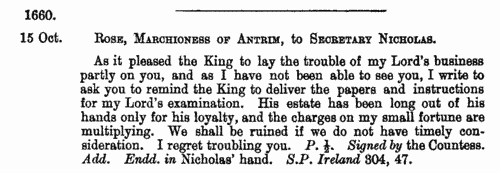
| Surrey Sessions
(1661-1663)
Surrey Sessions Rolls and Order Books. These are abstracts of sessional orders, minutes of criminal cases, memoranda and other entries of record taken from the Order Books from October 1661 to January 1663, inclusive, and the Sessions Rolls for October 1661, January 1662, April 1662, July 1662, October 1662 and January 1663. | Sample scan, click to enlarge

| Suffolk Archdeaconry Marriage Licences: Brides
(1664)
Marriage licence bonds in the Suffolk Archdeaconry Registry at Ipswich, abstracted and printed by Frederick Arthur Crisp. | Sample scan, click to enlarge

| Early settlers of Connecticut
(1636-1665)
The colony of Connecticut was settled in 1633 by emigrants from Massachusetts. The modern state of Connecticut also includes the colony of Newhaven. The seat of government of Connecticut was established in 1635 at Newtown (Hartford), on the site of a Dutch fort. The first volume of the Connecticut colony records is in three parts: 1, the records of the General and Particular Courts from April 1636 to December 1649; 2, Copy wills and probate inventories; 3, Grants and Conveyances of Lands, mostly from 1662 to 1690. The second volume of the records contains the minutes of the General Court from February 1650 to October 1669. In accordance with a resolution of the General Assembly, J. Hammond Trumbull transcribed the whole of the surviving court records as far as May 1665 (the union with Newhaven colony), with the probate material from 1640 to 1649, and these were published as 'The Public Records of the Colony of Connecticut' in 1850. | Sample scan, click to enlarge
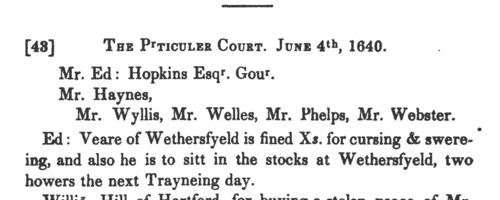
| Oxford householders
(1665)
Hearth tax was raised by assessing each householder on the number of chimneys to the dwelling. This provided a simple way to make a rough judgment as to the value of the dwelling. In Oxford the returns were made by ward, and then by parish. The return for 1665 (164/154) was edited by J. E. Thorold Rogers and printed for the Oxford Historical Society in 1891. The Roman numerals given are the numbers of hearths: where two or more people are grouped together with one number, it may be assumed that they were heads of separate households sharing a single building with that number of chimneys. Full names are given: only in a few instances is occupation given, nor are the streets indicated; however, there were thirteen ancient parishes in the city, none being very extensive, so a fairly good indication of location is given by the parish name. | Sample scan, click to enlarge

| Middlesex Recusants
(1625-1666)
Incidents from the Middlesex Sessions Books. These are abstracts of sessional orders, minutes of criminal cases, memoranda and other entries of record taken from the volumes of Gaol Delivery Register, Books and Rolls, Sessions of Peace Register, and Process Books of Indictments for the county of Middlesex from the death of king James I to the Great Fire of London. The references at the end of each item indicate the volume in question, the abbreviations being G. D. for Gaol Delivery, S. P. for Sessions of Peace, and S. O. T. for Session of Oyer and Terminer; occasionally preceded by S. for Special or G. for general, or followed by R. for Roll or Reg. for Register. It should be noted that, in the case of 'true bills' or indictments, the abstract starts with the date on which the offence took place, the date of the conviction &c. being at the end of the entry. There are many records of recusants, that is Protestants and Roman Catholics who failed to attend Church of England services. These abstracts, prepared by John Cordy Jeaffreson for the Middlesex County Record Society, are far from being a complete calendar of these extensive records; his purpose was, in part, to notice 'every parchment that should exhibit a famous person's name or any other feature of personal interest'. Being unable to print in full the longer lists of the conventiclers and recusants recorded, he ignores 'those persons who appear from their descriptions to have been of humble degree'. | Sample scan, click to enlarge
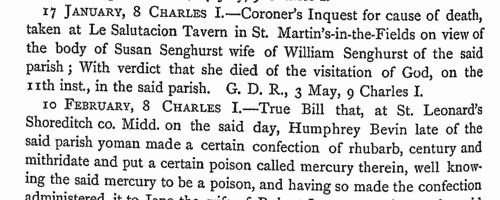
| Speakers of sedition in Middlesex
(1625-1666)
Incidents from the Middlesex Sessions Books. These are abstracts of sessional orders, minutes of criminal cases, memoranda and other entries of record taken from the volumes of Gaol Delivery Register, Books and Rolls, Sessions of Peace Register, and Process Books of Indictments for the county of Middlesex from the death of king James I to the Great Fire of London. The references at the end of each item indicate the volume in question, the abbreviations being G. D. for Gaol Delivery, S. P. for Sessions of Peace, and S. O. T. for Session of Oyer and Terminer; occasionally preceded by S. for Special or G. for general, or followed by R. for Roll or Reg. for Register. It should be noted that, in the case of 'true bills' or indictments, the abstract starts with the date on which the offence took place, the date of the conviction &c. being at the end of the entry. Political dissent in these troubled times often led to criminal conviction as a 'speaker of sedition'. These abstracts, prepared by John Cordy Jeaffreson for the Middlesex County Record Society, are far from being a complete calendar of these extensive records; his purpose was, in part, to notice 'every parchment that should exhibit a famous person's name or any other feature of personal interest'. | Sample scan, click to enlarge
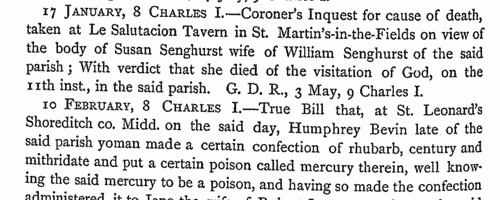
| Inhabitants of Manchester, and travellers
(1633-1666)
The constables' accounts of the manor of Manchester in Lancashire from 1633 to 1647 were edited by J. P. Earwaker and published in 1892. The accounts largely consist of details of disbursements by the constables, and as such include payments to paupers and soldiers with passes to help them on their journeys to and from other parts of the country. Earwaker added nine 'important appendices' to the work: 1. Disbursements and Receipts during the Plague of Manchester, 1605-6 and 1606 (from State Papers Domestic in the Public Record Office); 2. List of the Books of Assessment, Charity Money Accounts, &c., now in the Possession of the Corporation; 3. List of the Inhabitants of Manchester in 1648 (pages 181 to 201); 4. List of the Inhabitants of Manchester in 1651 (202-221); 5. Disbursements of the Constables in 1651-2; 6. List of the Inhabitants of Manchester assessed in 1659 (225-246); 7. A Second List of the Inhabitants of Manchester in 1659 (247-260); 8. List of the Inhabitants of Manchester assessed in 1666 (261-283); and 9. List of Uncommon, Obsolete, and Dialect Words to be found in the Preceding Pages. | Sample scan, click to enlarge
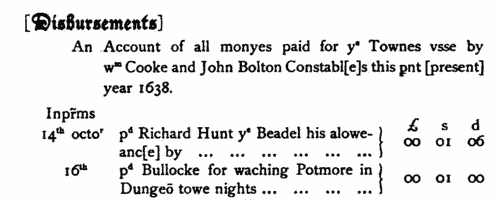
| Allegations for marriages in southern England
(1660-1669)
The province or archbishopric of Canterbury covered all England and Wales except for the northern counties in the four dioceses of the archbishopric of York (York, Durham, Chester and Carlisle). Marriage licences were generally issued by the local dioceses, but above them was the jurisdiction of the archbishop, exercised through his vicar-general. Where the prospective bride and groom were from different dioceses it would be expected that they obtain a licence from the archbishop; in practice, the archbishop residing at Lambeth, and the actual offices of the province being in London, which was itself split into myriad ecclesiastical jurisdictions, and spilled into adjoining dioceses, this facility was particularly resorted to by couples from London and the home counties, although there are quite a few entries referring to parties from further afield. The abstracts of the allegations given here usually state name, address (street in London, or parish), age, and condition of bride and groom; and sometimes the name, address and occupation of the friend or relative filing the allegation. Where parental consent was necessary, a mother's or father's name may be given. The ages shown should be treated with caution; ages above 21 tended to be reduced, doubtless for cosmetic reasons; ages under 21 tended to be increased, particularly to avoid requiring parental consent; a simple statement 'aged 21' may merely mean 'of full age' and indicate any age from 21 upwards. These are merely allegations to obtain licences; although nearly all will have resulted in the issuing of the licence, many licences did not then result in marriage. | Sample scan, click to enlarge

| Authors (1669)
The Mercurius Librarius catalogued new books printed or reprinted in London: Easter term 1669
| Sample scan, click to enlarge
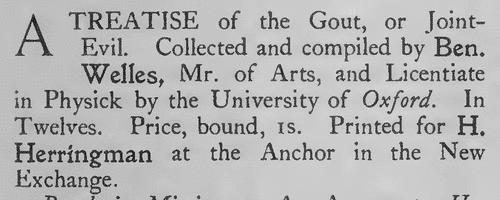
|
Research your ancestry, family history, genealogy and one-name study by direct access to original records and archives indexed by surname.
|











